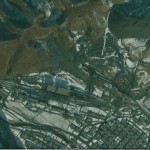Although they feel responsible for the future of their country, they generally work alone in a foreign land. Their family members are kept “hostage,” and they must resort to secretive tactics to bypass international sanctions to feed their leaders’ voracious appetite for Japanese products.
Yet being a trade agent is a favored occupation among North Koreans.
The job allows individuals to live a fairly free life outside of North Korea and can lead to the accumulation of wealth. That is, if everything goes well.
“In the past, the symbol of the wealthy were those Korean nationals who returned from Japan,” a trade agent said. “However, with the suspension of travel by the Man Gyong Bong-92 (cargo-passenger ship that sailed between Japan and North Korea), it has now become the time for trade agents.”
North Korean trade agents in China are under the strict control of Pyongyang.
To be chosen as a trade agent, individuals must have the right background, including not having any family link to the old capitalist class or relatives who are considered anti-state.
They must have also worked for a government institution or major state-run company.
Prospective agents are scouted by trading companies and are only approved by the government after a rigorous background check by state security, Foreign Ministry and other authorities.
Many seeking to become trade agents use their personal connections or even bribes, according to sources.
Trade agents allowed to work in China must leave behind at least one family member in North Korea to deter the agents from defecting.
One trade agent from Pyongyang established a base in a condominium in the central part of a Chinese city. At the start of every day, the agent bows to portraits on the walls of Kim Il Sung, the founder of North Korea, and his son, Kim Jong Il, to pray for successful business.
“We have the burden of the nation on our shoulders. We have to use any means possible to turn a profit,” the agent said.
About 300 North Korean trading companies have been confirmed. They are all affiliated with North Korean government agencies or the military.
Sources said Pyongyang has dispatched nearly 1,000 trade agents to Beijing and 600 or so to Shanghai. Major regional cities are also home to between 100 and 200 North Korean trade agents.
Every night, the trade agents must contact supervisors dispatched by the North Korean government to offices in various cities in China. The agents report on their business activities as well as on their personal movements. Those reports are then transmitted to the headquarters of the trading company that dispatched the agents and to related government agencies.
Every Saturday, the agents must gather at the regional offices for study sessions on the instructions and policies of the Workers’ Party of Korea.
Depending on the experience of each agent and the size of the operation, between $5,000 (412,000 yen) and $60,000 from profits are transferred to North Korea. The trade agent has to use whatever is left over for future business and daily life.
Many agents barely eke out a living, and those who cannot fulfill the government-set quotas are recalled.
The trade agents sell North Korean mining resources, such as coal and iron ore, lumber and seafood. They buy foodstuffs, pharmaceutical drugs, daily necessities and equipment from China.
According to Chinese government statistics, North Korea’s total trade with China in 2009 reached about $2.68 billion, an increase of 5.5 times over 2000. As North Korea becomes more isolated, its trade dependence on China has soared to 73 percent.
The more elite trade agents are dispatched by state-run trading companies to major Chinese cities, such as Beijing, on long-term commercial visas.
Although they are company employees, the North Koreans are unlike the agents working for Japanese trading companies, who may have a large support staff.
The elite North Korean agents often work alone and handle large projects with huge piles of money handed to them by Pyongyang.
After North Korea conducted its first nuclear test, Japan banned exports of luxury items, such as expensive foods, cars and precious metals, from November 2006. After Pyongyang’s second nuclear test in 2009, Japan banned all exports to North Korea.
Despite the sanctions, high-quality Japanese products remain very popular in North Korea. That means the elite trade agents must find ways around the strict sanctions to buy Japanese products and secretly transport them to North Korea.
Generally, the agents make it look like the Japanese products have been purchased by a Chinese entity.
According to sources, the agents often have Japanese products transported to a bonded district in a Chinese port where duties do not have to be paid. Those products are then loaded onto another ship bound for North Korea.
Another method is to have Japanese products pass Chinese customs and traded among a number of Chinese companies before being purchased for shipment to North Korea.
“Japanese companies have become much more cautious because of the total export ban, so it has become harder to obtain Japanese products. Still, there are ways to purchase such products,” said a Chinese worker who trades with North Korea.
Sources said North Korean demand is particularly strong for Japanese-made pharmaceutical drugs, medical equipment, cars and cosmetics.
“Although Chinese products are cheap and readily available, their reputation is not good because the quality is bad,” a Chinese source said. “There is strong demand among the affluent for Japanese-made drugs and foods.”
The North Korean leadership understands the importance of the traders and their roles.
Sources said that when Kim Jong Il visited China last year, he heard about complaints from Chinese companies that they were not receiving payments from North Korean trade agents.
After returning to North Korea, Kim Jong Il is said to have ordered trade officials to settle the unpaid accounts to restore trust in North Korea.
The sources said sudden payments of such unsettled accounts became more frequent from late last year.

